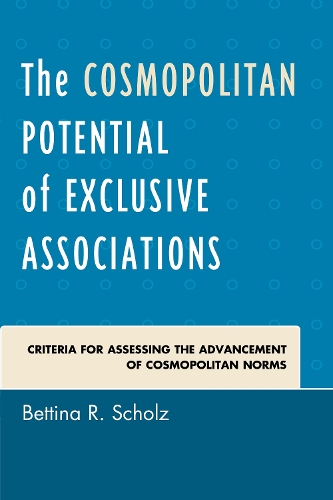
The Cosmopolitan Potential of Exclusive Associations: Criteria for Assessing the Advancement of Cosmopolitan Norms
(Hardback)
Publishing Details
The Cosmopolitan Potential of Exclusive Associations: Criteria for Assessing the Advancement of Cosmopolitan Norms
By (Author) Bettina R. Scholz
Bloomsbury Publishing PLC
Lexington Books
8th October 2015
United States
Classifications
Professional and Scholarly
Non Fiction
Ethics and moral philosophy
Diplomacy
Human rights, civil rights
International institutions / intergovernmental organizations
320.01
Physical Properties
Hardback
242
Width 159mm, Height 235mm, Spine 23mm
508g
Description
Contemporary cosmopolitan moral theorists argue that, in our increasingly interconnected world, all individuals need to recognize that moral duties span state borders, involving responsibilities such as respecting human rights. Such arguments usually focus on the duties of individuals or on reforms for international political and economic institutions. The Cosmopolitan Potential of Exclusive Associations draws attention to how non-state, not-for-profit transnational associations can advance respect for equality in a plurality of less obvious ways. By synthesizing moral theories of cosmopolitanism with international relations scholarship, it is possible to establish criteria for assessing whether and to what extent transnational associations like Mdecins sans Frontires (Doctors without Borders) or the International Olympic Committee cultivate respect for fellow humans and build transnational communities. As these examples show, not all non-state associations have the mission of advocating for human rights. Membership is also not necessarily inclusive of all humanity. Membership criteria exclude based on criteria such as professional expertise, athletic prowess, or certain religious beliefs. As a result, assessing their impact requires looking for partial expressions of cosmopolitanism that arise piecemeal and without self-conscious intention. Rather than defending one version of cosmopolitan theory as more applicable to evaluating the impact of associations, adapting and combining four common approaches to cosmopolitanism(1) institutional cosmopolitanism, (2) natural duties cosmopolitanism, (3) cultural cosmopolitanism, and (4) deliberative democratic cosmopolitanismmakes it possible to evaluate institutional, developmental, shared-identity, or public-sphere effects of associations. Applying the criteria to associations that do not self-consciously advance cosmopolitanism shows the potential for partial forms of cosmopolitanism. Mdecins sans Frontires, the first case explored, provides emergency medical care across the globe without establishing a transnational community with those it aids. The International Olympic Committee, the second case, brings the world together around global games in which national teams compete against each other. Dissidents in the Anglican Communion, the third case, unite across borders but do so in favor of an interpretation of the Bible that excludes gay men from ordained ministry. Despite non-cosmopolitan elements, each case has lessons about how respect for transnational equality can emerge in subtle ways without self-conscious belief in cosmopolitan moral philosophy.
Reviews
The Cosmopolitan Potential of Exclusive Associations is an important contribution to the latter question, as Bettina Scholz explores the ways in which membership in voluntary, not-for-profit associations could generate and maintain such norms. Scholzs analysis is an interesting synthesis of cosmopolitan moral philosophy, constructivist approaches in international relations, and civil society scholarship.... [T]he valuable insights of this book...will be of interest to scholars in the fields of political theory and international relations alike. * Political Theory *
While both abstract philosophical work and empirical scholarship on the emergence of norms are undoubtedly important, it is crucial to recognize the value of works such as Scholzs, which seek to bridge the gap between the normative and the descriptive, and do not shy away from acknowledging the messy and complex reality of politics. * Perspectives on Politics *
Theorists of cosmopolitanism make austere demands: universal morality requires us to look past our own group affiliations, beyond every incarnation of exclusivity and particularism. Pluralism, on this view, is the enemy of universalism. Bettina Scholz tempers and humanizes cosmopolitanism. Using a rich array of cases the Anglican Church, the Olympics, Doctors Without Borders -- and a sharp set of standards, she studies the effects of membership in transnational voluntary associations. Scholzs work shows when and how these groups work often indirectly and regardless of their formal mission-- to develop cosmopolitan dispositions and generate cosmopolitan norms. She delivers a sober but hopeful message of the terms of coexistence of pluralism and universal morality. -- Nancy Rosenblum, Harvard University
In The Cosmopolitan Potential of Exclusive Associations, Bettina Scholz makes a compelling contribution to the burgeoning field of cosmopolitan theory and practice. Most impressive is her rich examination of what might be called a post-universalist approach to critical cosmopolitan theory anchored in every day political and sociological practices that really matter. The book promises to be widely read and should be very seriously considered for course adoption in classes on cosmopolitan thought and theories of justice as well as constructivist theory in comparative politics and international relations. -- Joel Krieger, Wellesley College
Bettina Scholzs innovative new book aims to press the cosmopolitan project further, by examining the conditions in the real world that motivate individuals to advance cosmopolitan goals. As Scholz observes, many individuals belong to associations that are transnational in reach; an in-depth study of voluntary, transnational organizations can provide useful tools in understanding how and why individuals take up cosmopolitan objectives. Scholz develops what she terms a mid-level cosmopolitan theory and in so doing identifies criteria by which to evaluate the cosmopolitan potential of transnational associations. Scholzs analysis, which combines a sophisticated understanding of political theory with three thoroughly grounded case studies, can serve as an important blueprint for those desiring to create and nurture cosmopolitan citizenship in practice. -- Patti Tamara Lenard, University of Ottawa
Author Bio
Bettina Scholz is assistant professor of political science at Stonehill College.
